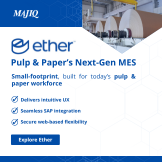Metsä Group reported a comparable operating loss of Euro 27 million for the first nine months of 2025, down from a Euro 170 million profit a year earlier, as deteriorating market conditions pressured its core businesses. Net sales increased to Euro 4.51 billion from Euro 4.27 billion, but operating profitability fell to -0.6% of sales. The drop was primarily driven by weak demand for pulp in Europe and China, and a slowdown in US paperboard orders following tariffs.
Demand for market pulp was particularly weak in China, where average sales prices declined by 7% from the previous quarter. In Europe, prices fell by 5%. Although delivery volumes improved from the previous quarter, they remained below early-year levels. Metsä curtailed production at its Joutseno pulp mill in response. Comparable operating losses in the pulp and sawn timber segment widened to Euro 69 million from a Euro 14 million profit in the same period last year.
In paperboard, Metsä Board posted a comparable operating loss of Euro 46 million, reversing a Euro 73 million profit a year earlier. Folding boxboard and white kraftliner deliveries fell to 1.06 million tonnes from 1.13 million tonnes. The US market, which accounts for roughly 70% of Metsä Board's exports to America, remained weak, with tariffs introduced in August curbing demand. The company reported limited ability to offset the tariff impact with higher prices. The Husum mill, heavily reliant on US orders, was particularly affected.
The Wood Products Industry posted a Euro 6 million comparable operating loss for the third quarter, driven by weak construction activity in Europe and operational disruptions tied to ERP system deployment. Delivery capacity was impaired at the Suolahti mill and in the UK upgrading business, leading to customer losses and compensation. Demand for spruce plywood remained low, and logistics costs increased. Production curtailments and the planned closure of the Suolahti mill by 2026 further weighed on results.
In contrast, Metsä Tissue improved its comparable operating result to Euro 21 million in Q3, up from Euro 16 million a year earlier, supported by increased tissue deliveries and cost reductions. The new Mariestad tissue mill in Sweden began customer deliveries during the quarter.
To address ongoing losses, Metsä Group finalized a Euro 300 million cost savings program. Measures include optimizing procurement, logistics, and wood supply chains. The company launched statutory negotiations in October, targeting the reduction of 800 permanent jobs, mostly in Finland.
Looking ahead, the company expects softwood pulp demand to remain weak due to competition from hardwood pulp and subdued paper demand. Paperboard deliveries are expected to decline slightly in Q4. Demand for tissue remains stable, but uncertainty persists in greaseproof papers due to Chinese competition.
Metsä Group will not issue specific earnings guidance, citing volatility in pulp and paperboard markets and global economic uncertainty.






















